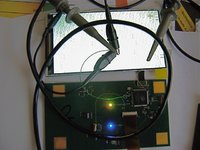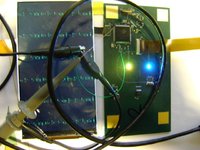Well, first of all, sorry that I'm really really late posting the news this time.
Yes, really late, as the latest 3D printed cases actually arrived March 30th... so over a week ago, and I didn't post any pictures, videos or informations here.
I was caught in the Matrix! ... well, not really, but I had very little time, as the Retrode2 also arrived back in stock (with tons of orders to ship) and then there was easter and I was working on my new online shop (which should go online within the next few weeks).
Additionally, I had to do more live video mixing (my main job), as our icehockey team reached the finals in the PlayOffs.
So I didn't really find the time to post, but of course things were still moving forward.
1. The Case
As mentioned, the latest 3D prints arrived and it's now 99% finished in my opinion.
The edges are rounded which is a lot more comfortable with your hands, the shoulder buttons are easily reachable and feel fine, the PCB fits nicely.
The only changes I had were related to the LCD cable (to make it easier to assemble the unit), the area around the display (to improve it a bit and make it easier to assemble / disassemble) and we need to check the tolerances for the shoulder buttons so that all PCBs will work with all cases out of the box.
Apart from that, I'm happy with the case and hope to make you a video soon
2. The Rotator Chip
We had a small step backwards 1,5 weeks ago but now catched up and are a step further.
Maybe you remember: We were able to communicate with the SSD (rotator chip) last year in June / July, but didn't setup the panel back then.
Well, Nikolaus wanted to test the rotator chip in the final unit last week - but each time he tried to set it up, it stopped communicating... a hardware issue?
He checked all possible causes, disabled all other devices and power lines on the mainboard that could cause issues, but the issue still remained.
After some research and testing, we found out that the SSD has a smaller tolerance regarding the clockspeed than the normal MIPI standard is - it was written down somewhere in the large datasheet.
And yes - once that was fixed in the software, communications with the SSD worked!
We can successfully read and write registers and it successfully reports all details about the connected LCD Panel-
It also shows some stuff on the LCD - Nikolaus calls it garbage, I think it just shows us the Matrix


(What you can see here is the LCD connected to the Display PCB incl. the rotator chip. The manually soldered cables are used for probing and hardware testing)
What does that mean?
Well, we know the hardware works fine, so another important step done.
What's left is to write the driver for the chip, and then our next step would be finishing the CPU board so we can build and test a final prototype of the Pyra!
3. Battery and LCD Cable
Both the new battery and LCD Cable prototypes have been finished and are on the way to me.
So once the CPU PCB is finished, we can REALLY assemble a full unit inside a case!
That will be a milestone - and then it's not that far off the mass production!
That's all for today.
I'll try to read the keyboard layout discussion soon and also make a video with the printed case.
See you soon!
Yes, really late, as the latest 3D printed cases actually arrived March 30th... so over a week ago, and I didn't post any pictures, videos or informations here.
I was caught in the Matrix! ... well, not really, but I had very little time, as the Retrode2 also arrived back in stock (with tons of orders to ship) and then there was easter and I was working on my new online shop (which should go online within the next few weeks).
Additionally, I had to do more live video mixing (my main job), as our icehockey team reached the finals in the PlayOffs.
So I didn't really find the time to post, but of course things were still moving forward.
1. The Case
As mentioned, the latest 3D prints arrived and it's now 99% finished in my opinion.
The edges are rounded which is a lot more comfortable with your hands, the shoulder buttons are easily reachable and feel fine, the PCB fits nicely.
The only changes I had were related to the LCD cable (to make it easier to assemble the unit), the area around the display (to improve it a bit and make it easier to assemble / disassemble) and we need to check the tolerances for the shoulder buttons so that all PCBs will work with all cases out of the box.
Apart from that, I'm happy with the case and hope to make you a video soon
2. The Rotator Chip
We had a small step backwards 1,5 weeks ago but now catched up and are a step further.
Maybe you remember: We were able to communicate with the SSD (rotator chip) last year in June / July, but didn't setup the panel back then.
Well, Nikolaus wanted to test the rotator chip in the final unit last week - but each time he tried to set it up, it stopped communicating... a hardware issue?
He checked all possible causes, disabled all other devices and power lines on the mainboard that could cause issues, but the issue still remained.
After some research and testing, we found out that the SSD has a smaller tolerance regarding the clockspeed than the normal MIPI standard is - it was written down somewhere in the large datasheet.
And yes - once that was fixed in the software, communications with the SSD worked!
We can successfully read and write registers and it successfully reports all details about the connected LCD Panel-
It also shows some stuff on the LCD - Nikolaus calls it garbage, I think it just shows us the Matrix


(What you can see here is the LCD connected to the Display PCB incl. the rotator chip. The manually soldered cables are used for probing and hardware testing)
What does that mean?
Well, we know the hardware works fine, so another important step done.
What's left is to write the driver for the chip, and then our next step would be finishing the CPU board so we can build and test a final prototype of the Pyra!
3. Battery and LCD Cable
Both the new battery and LCD Cable prototypes have been finished and are on the way to me.
So once the CPU PCB is finished, we can REALLY assemble a full unit inside a case!
That will be a milestone - and then it's not that far off the mass production!
That's all for today.
I'll try to read the keyboard layout discussion soon and also make a video with the printed case.
See you soon!

